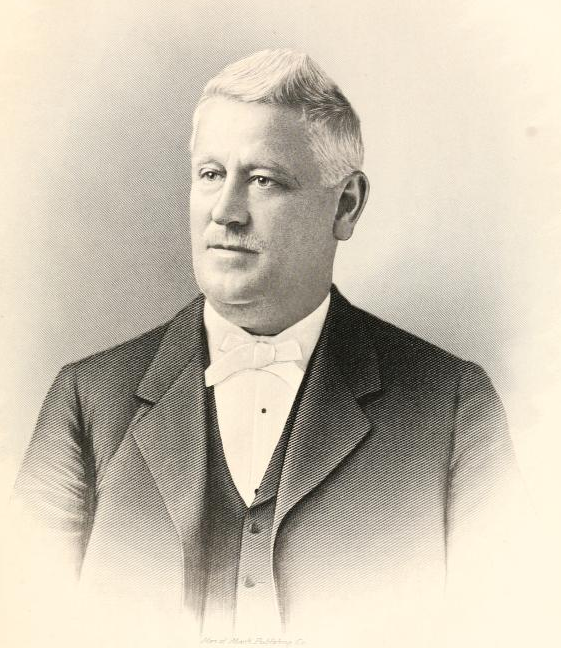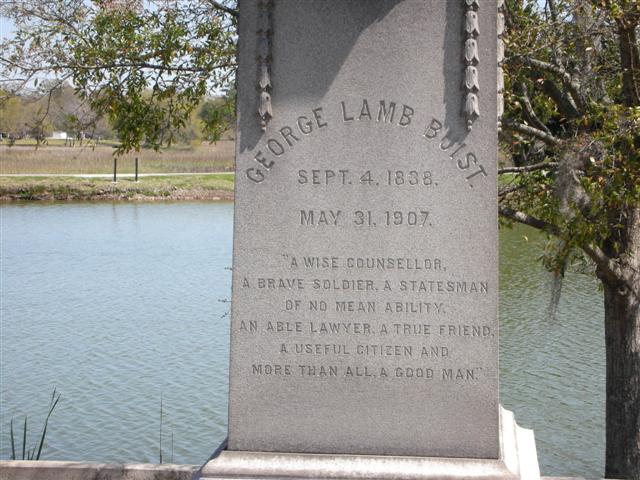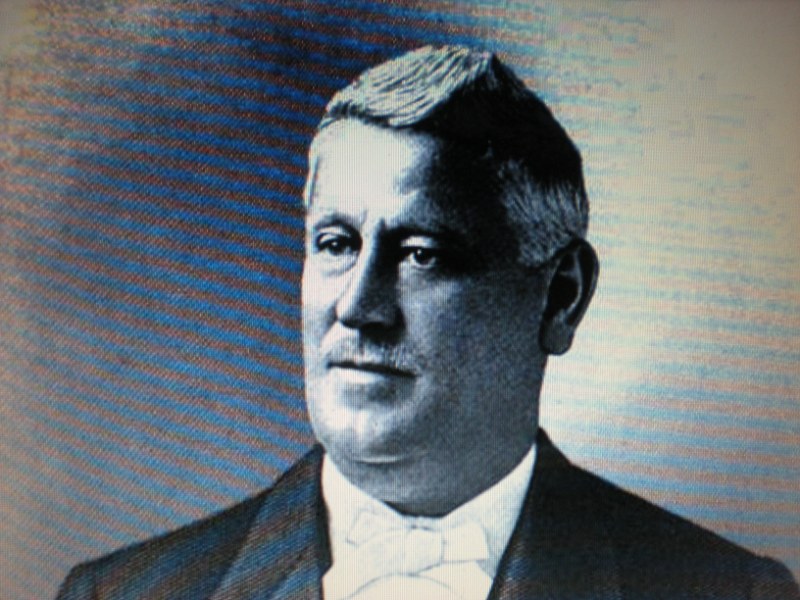Buist, George Lamb, lawyer, was born in Charleston, South Carolina, September 4, 1838. He was of Scotch extraction. His earliest ancestor in America was the Reverend George Buist, D. D. who was born in Fifeshire, in Scotland, in 1770, and was graduated at the University of Edinburgh. He came to Charleston in 1798 upon the call of the Scotch Presbyterian church of Charleston, and became the minister of that church. Reverend Doctor Buist was an eminent divine, the author of two volumes of sermons, and was for some time the head of the College of Charleston.
The father of George Lamb Buist was George Buist, and his mother's name was Mary Edwards (Jones) Buist. George Buist was an attorney at law by profession, and held for many years, and until his death, the office of judge of probate, or ordinary, for Charleston county. He was also a trustee on many educational boards, and was one of the commissioners of the Orphan House in Charleston. His marked characteristics were his sterling integrity, a fund of rational common sense, and a wise and honest heart.
The early life of the subject of this sketch was passed in the city of Charleston, South Carolina. His physical condition in childhood and youth was good; he was fond of athletic exercises, and as a boy was devoted to outdoor sports, though his special tastes and interests lay in the lines of reading and public speaking and delivery. The influence of his mother was particularly strong upon his intellectual, moral and spiritual life. He had no difficulties to overcome in acquiring an education, but availed himself o the best advantages offered him by the schools and colleges of his native city. His chief line of study was in the classics and rhetoricl. A part of his studies were pursued at the New Jersey academy at Burlington, New Jersey. From there he went to the Charleston college. He studied law of his own accord, in his father's office, and was admitted to the bar in January, 1860. He felt early the necessity for providing for obligations which he had assumed, and applied himself earnestly to the practice of his profession, soon building up a large and lucrative business. He married, early in life, Miss Martha Allston White, They have had ten children, seven of whom are still living. Mr. Buist always attributed his success in life to the effect of his early home influences. He has long been a man of mark in his native state and city, When the War between the States broke out, he went into the Confederate States army as a lieutenant of the Palmetto Guards and served in the Iron Battery on Morris Island in command of the eight-inch gun; afterward he became captain of the Palmetto Guards artillery, and, eventually rose to the rank of major of artillery, and served in that capacity until the surrender of General Johnston's army.
After the war was over, he returned to the practice of his profession, and having been elected to the South Carolina legislature, he served for sixteen years was senator from Charleston county. During his service in the house he was chairman of the Ways and Means committee, and after he became senator he served as the chairman of the Finance committee of the senate.
In a recent number of "The News and Courier" the following just tribute was paid to Mr. Buist for one of the greatest services performed by him for the community in which he lives and by which he has been highly honored for many years.
"An influence that lives.
"A community such as Charleston should at all timjes be represented in the state legislature by her best and ablest men. Whether they are in the minority or the majority, their influence cannot be destroyed, and the work that representatives and senators of this county performed years ago is still bearing fruit. This strikingly illustrated by the following, taken from a Columbia "State" editorial of May 25, replying to a correspondent who defended the dispensary:
"Does he know that for years a dispensary opponent had no more chance of fair treatment in either the executive or legislative branches of government than a Republican. Does he remember the metropolitan police in Charleston. Does he remember that magnificient appeal to South Carolinians made in the senate by George Lamb Buist in a vain endeavor to arouse some member of the majority to a realization of the enormity of the offence being perpetrated against the people of Charleston in depriving them of local self-government. Like and old lion surrounded by enemies, Major Buist made the greatest speech those halls had heard for twenty years, and probably the greatest speech they will hear for twenty years to come. And with what result. They same treatment that would be accorded a wounded lion bravely facing a band of Zulus armed with assegias.
"The metropolitan police has long since ceased to be other than an unpleasant memory, and not only has the eloquent remonstrance of Ex-Senator Buist been fully vindicated, but it remains in the memories of men to be used as an argument in the fight to free the state of the miserable whiskey system which made the metropolitan police possible.
"We risk nothing in saying that throughout South Carolina the ability and courage which Charlestonians displayed in legislation, when they were opposed by an overwhelming and envenomed majority, is recalled with respect and pride by these same opposers whose ears have later opened to words of truth and soberness"
Other important public services were rendered by Mr. Buist, especially along education lines. He was a trustee of the College of Charleston, and was for many years a commissioner of the public school. Mr. Buist was an enthusiastic Mason, and held the office of master of Franklin lodge. He was always identified with the Democratic party and never changed his political or party allegiance upon any issues. He was a member of the Episcopal church, and was for many years chairman of the vestry of St. Paul's Episcopal church, Radcliffeboro, in Charleston. He was always a busy man, and allowed himself little relaxation except an annual trip to Saratoga Springs, New York.
Mr Buist's philosophy of life consisted in a grateful and contented nature. He believed that to have the approbation of a good conscience and the esteem of all good people was better than riches or worldly eminence.
Since this biography was prepared for the printed, Mr. Buist died about midnight of Thursday, May 20, 1907, at his home in Charleston.
He married Martha Allston White on May 22, 1862 by the Rev. C. P. Gadsden.
Buist, George Lamb, lawyer, was born in Charleston, South Carolina, September 4, 1838. He was of Scotch extraction. His earliest ancestor in America was the Reverend George Buist, D. D. who was born in Fifeshire, in Scotland, in 1770, and was graduated at the University of Edinburgh. He came to Charleston in 1798 upon the call of the Scotch Presbyterian church of Charleston, and became the minister of that church. Reverend Doctor Buist was an eminent divine, the author of two volumes of sermons, and was for some time the head of the College of Charleston.
The father of George Lamb Buist was George Buist, and his mother's name was Mary Edwards (Jones) Buist. George Buist was an attorney at law by profession, and held for many years, and until his death, the office of judge of probate, or ordinary, for Charleston county. He was also a trustee on many educational boards, and was one of the commissioners of the Orphan House in Charleston. His marked characteristics were his sterling integrity, a fund of rational common sense, and a wise and honest heart.
The early life of the subject of this sketch was passed in the city of Charleston, South Carolina. His physical condition in childhood and youth was good; he was fond of athletic exercises, and as a boy was devoted to outdoor sports, though his special tastes and interests lay in the lines of reading and public speaking and delivery. The influence of his mother was particularly strong upon his intellectual, moral and spiritual life. He had no difficulties to overcome in acquiring an education, but availed himself o the best advantages offered him by the schools and colleges of his native city. His chief line of study was in the classics and rhetoricl. A part of his studies were pursued at the New Jersey academy at Burlington, New Jersey. From there he went to the Charleston college. He studied law of his own accord, in his father's office, and was admitted to the bar in January, 1860. He felt early the necessity for providing for obligations which he had assumed, and applied himself earnestly to the practice of his profession, soon building up a large and lucrative business. He married, early in life, Miss Martha Allston White, They have had ten children, seven of whom are still living. Mr. Buist always attributed his success in life to the effect of his early home influences. He has long been a man of mark in his native state and city, When the War between the States broke out, he went into the Confederate States army as a lieutenant of the Palmetto Guards and served in the Iron Battery on Morris Island in command of the eight-inch gun; afterward he became captain of the Palmetto Guards artillery, and, eventually rose to the rank of major of artillery, and served in that capacity until the surrender of General Johnston's army.
After the war was over, he returned to the practice of his profession, and having been elected to the South Carolina legislature, he served for sixteen years was senator from Charleston county. During his service in the house he was chairman of the Ways and Means committee, and after he became senator he served as the chairman of the Finance committee of the senate.
In a recent number of "The News and Courier" the following just tribute was paid to Mr. Buist for one of the greatest services performed by him for the community in which he lives and by which he has been highly honored for many years.
"An influence that lives.
"A community such as Charleston should at all timjes be represented in the state legislature by her best and ablest men. Whether they are in the minority or the majority, their influence cannot be destroyed, and the work that representatives and senators of this county performed years ago is still bearing fruit. This strikingly illustrated by the following, taken from a Columbia "State" editorial of May 25, replying to a correspondent who defended the dispensary:
"Does he know that for years a dispensary opponent had no more chance of fair treatment in either the executive or legislative branches of government than a Republican. Does he remember the metropolitan police in Charleston. Does he remember that magnificient appeal to South Carolinians made in the senate by George Lamb Buist in a vain endeavor to arouse some member of the majority to a realization of the enormity of the offence being perpetrated against the people of Charleston in depriving them of local self-government. Like and old lion surrounded by enemies, Major Buist made the greatest speech those halls had heard for twenty years, and probably the greatest speech they will hear for twenty years to come. And with what result. They same treatment that would be accorded a wounded lion bravely facing a band of Zulus armed with assegias.
"The metropolitan police has long since ceased to be other than an unpleasant memory, and not only has the eloquent remonstrance of Ex-Senator Buist been fully vindicated, but it remains in the memories of men to be used as an argument in the fight to free the state of the miserable whiskey system which made the metropolitan police possible.
"We risk nothing in saying that throughout South Carolina the ability and courage which Charlestonians displayed in legislation, when they were opposed by an overwhelming and envenomed majority, is recalled with respect and pride by these same opposers whose ears have later opened to words of truth and soberness"
Other important public services were rendered by Mr. Buist, especially along education lines. He was a trustee of the College of Charleston, and was for many years a commissioner of the public school. Mr. Buist was an enthusiastic Mason, and held the office of master of Franklin lodge. He was always identified with the Democratic party and never changed his political or party allegiance upon any issues. He was a member of the Episcopal church, and was for many years chairman of the vestry of St. Paul's Episcopal church, Radcliffeboro, in Charleston. He was always a busy man, and allowed himself little relaxation except an annual trip to Saratoga Springs, New York.
Mr Buist's philosophy of life consisted in a grateful and contented nature. He believed that to have the approbation of a good conscience and the esteem of all good people was better than riches or worldly eminence.
Since this biography was prepared for the printed, Mr. Buist died about midnight of Thursday, May 20, 1907, at his home in Charleston.
He married Martha Allston White on May 22, 1862 by the Rev. C. P. Gadsden.
Family Members
-
![]()
Henry Buist
1829–1887
-
Mary Legare Buist Lucas
1831–1902
-
![]()
Thomas Buist
1833–1852
-
Abigail Jones Buist Sadler
1833–1915
-
![]()
Martha Buist Stevens
1835–1887
-
![]()
Sarah Jones Buist
1836–1916
-
![]()
Dr John Somers Buist
1839–1910
-
![]()
Susan J. Buist
1841–1918
-
![]()
Elizabeth Jones Buist
1842–1875
-
![]()
Anna Perry Buist Adams
1844–1919
-
![]()
Frances M Buist Elfe
1846–1895
-
![]()
Samuel Stevens Buist
1849–1916
Sponsored by Ancestry
Advertisement
Explore more
Sponsored by Ancestry
Advertisement



























